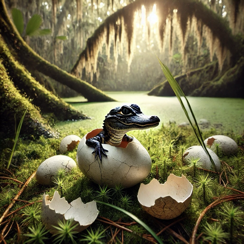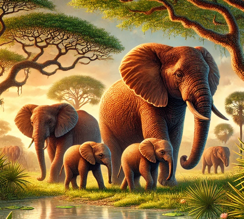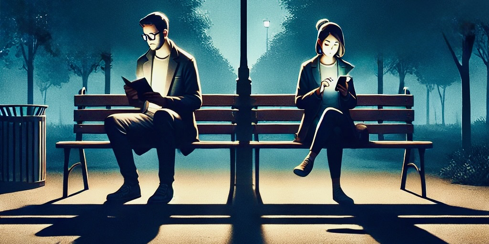If you could listen to a child's soul...
Excerpts from:

If you could listen to a child's soul...
A bright fall day at the Bronx Zoo. I was standing outside the bear pit, waiting. The pit was full: black bears, Kodiaks, grizzlies, even a pair of tiny Japanese sun bears. Cavorting in the sunlight, diving into the water, mock-wrestling for the sheer joy of it. Early in the day, peaceful and quiet.
A flock of children descended on me. Hard to tell their ages-maybe 6, 7, 8 years old? All dressed in school uniforms, but no two alike. Their teacher assembled them at the rail to the pit, patient with their eagerness, watchful against adventurous spirits wandering too close to the bears.
The children watched the bears- some solemn, some animated. A little girl waved gaily. A boy shouted something. The bears ignored them all, being themselves.
In the next pit, a solitary polar bear stood atop a barren peak of rock, her white pelt blending against the ice. She watched the newcomer, self-contained and uncaring. A tiny sound came from one of the caves. A fluffy white cub emerged, called to it's mother. The bear's gaze turned malevolent, warning me to stay away.
"Is she guarding the baby? "A child's voice at my elbow. A little girl, detached from the school group.
"Yeah," I told her. An Asian child, her face was tranquil with wisdom. A white boy at her shoulder, a black girl next to him.
"My mother does that," she told me.
"Mine don't" the white boy said.
I lit a cigarette. A blond girl tugged at my sleeve, pointing to the "No Smoking" sign. A handsome Latin boy sneered at her naiveté. I dropped the cigarette to the concrete, ground it out under my shoe. Looked over my shoulder, wondering when their teacher would come and collect them.
"Are they dangerous?" a little girl asked.
"Sure," I said.
"I'm not afraid," a boy exclaimed.
"I'd like to pat the baby," said another. Maybe you will someday, I thought.
"How come she's not with the other bears?" a boy asked.
"Because she has a baby," I explained.
"If the other bears came near her baby, she'd hurt them."
"Isn't she lonely?"
"She has her baby, stupid!" a little girl answered for me.
"So what?" another sneered.
I listened to them squabble, so distinct and unique in their uniforms, A rainbow of colors, a depthless vat of potential.
A tug at my sleeve, "Mister, do you have any children?"
I looked at the bear, "I don't know," I told the child. As I walked away, I heard her ask the teacher what the strange man meant.
Children of the world. Future flowers, now seeds. Some hand-raised, nourished in love-richened ground. Others tossed carelessly on the coldest concrete, struggling beneath Darwin's dispassionate sunlight.
Each unique, snowflake-individualized. And all the same.
Our race. The human race. One color-many shades.
Treasures to some, toys to others. Some will reach the stars-some will stalk the shadows.
What children are, more than anything else, is this: another chance for our flawed species to get it right.
"What is the difference between an elephant and an alligator?" the old man asked me. It wasn't a question. It was the way he taught. The way his ancestors have taught since the beginning of his tribe.
"Ones a mammal, ones a reptile," I replied. "One lives on land and one visits water, one lives in water and visits land. One is a flesh-eater, the other a vegetarian. Neither has natural enemies."
"But both are hunted, yes?"
"Yes I see. The elephants for their ivory, the alligators for their hides. They have the same enemy-man."
"You do not see. I asked you the difference, not the similarity."
"I told you many differences."
"Yet you missed the essential one. The difference that separates them forever.
"Is this a riddle?"
"Not a riddle, not a mystery. A truth you can learn...if you listen."

"I'm listening."
"The baby alligator comes out of the egg a perfectly formed predator. It will not grow, it will only get larger, do you see? It learns nothing. From the moment of its birth, it fights to survive. If it succeeds, it reaches its full size, it hunts. At birth it is nine inches long. In adulthood, perhaps nine feet. The difference can be measured. As a predator, it increased in competence, in skill. But, no matter what its fate, it will always be what it was born to be."
"I understand."

"Do you? Your work is with children. To work with children, you must know the child. The baby elephant cannot survive on its own. It needs nurturing, it needs protection. Without love, it dies. Depending on how it is raised, the baby elephant grows to be a work animal, a circus performer, a peaceful beast content to live in harmony. But some elephants grow up to be rogues, dangerous to humans. Depending on how they are raised-that is the key. You see the difference now?"
"Yes."
"And so, ask yourself: Are the children of man alligators, doomed to what they will be from the moment of birth? Or are they elephants, fated to be nothing specific and capable of anything?"
Children learn by imitation. Some imitate their oppressors. And we call them monsters.
A child meets a stranger, tilts her face up, expecting a kiss. Another's eyes are wary, asking, "Are you going to hurt me too?"
For a child, there is no sequence, only merger. It all happens together. Only the adults know what to call it. Only a child can feel it.
We are tested, and sometimes we fail. The maltreated child cries, "I hurt." Unheard or unheeded, that cry becomes a prophecy.
"Do unto others" becomes a battle cry.
The child seeks the answers but faces the symbols. Explain "situational ethics" to a child. If you can.
And so the child says: "I can make a life-I am an adult." And the world has more children.
And so the child says: "I can take a life-I am an adult." And the world has less.
If you could listen to a child's soul ... you might hear the lush blendings of a symphony or the harshest metronome: tick, tick, tick...
A bomb, awaiting its time.
Children are all the same. Genetic variations immaterial. Cultural variations but blossoms in the Earth's bouquet.
Children transcend. Born to war, they become healers. Born to privilege, they become warriors.
Within us all is that root of recognition. When we were all one.
One child.
If only we could learn to recognize one another in the darkness.
